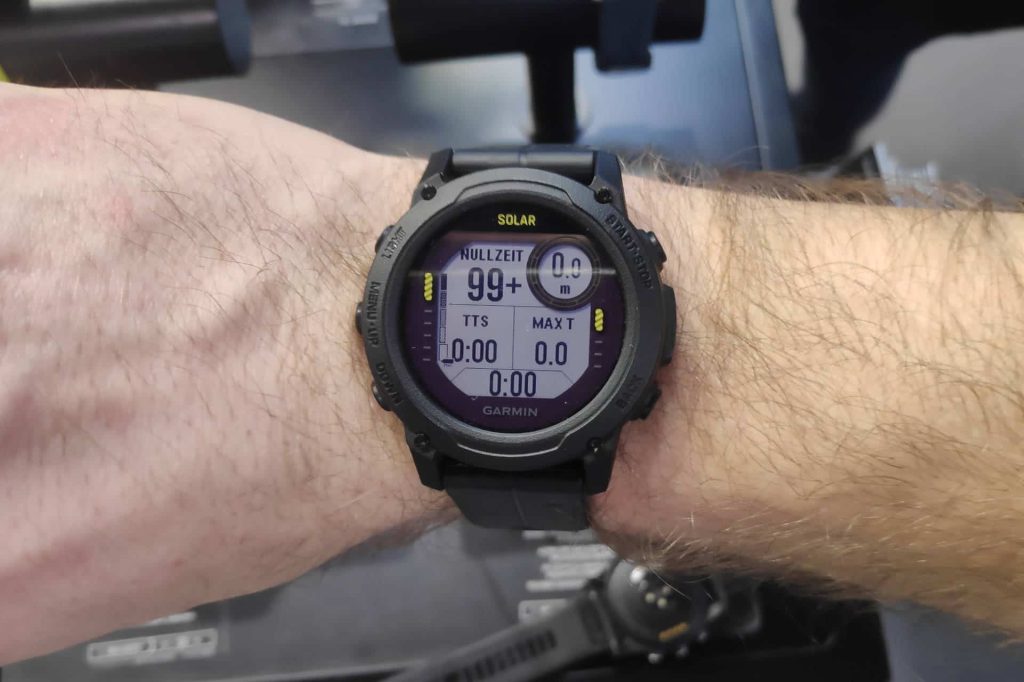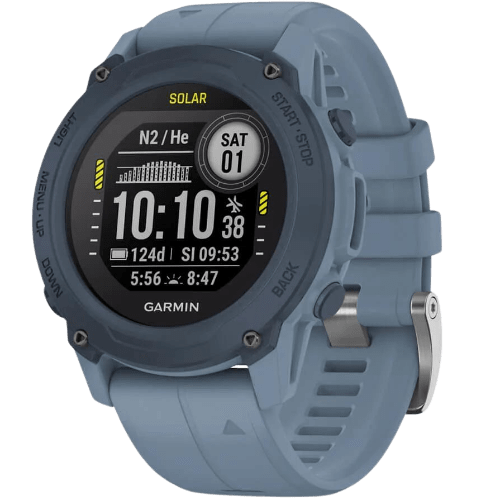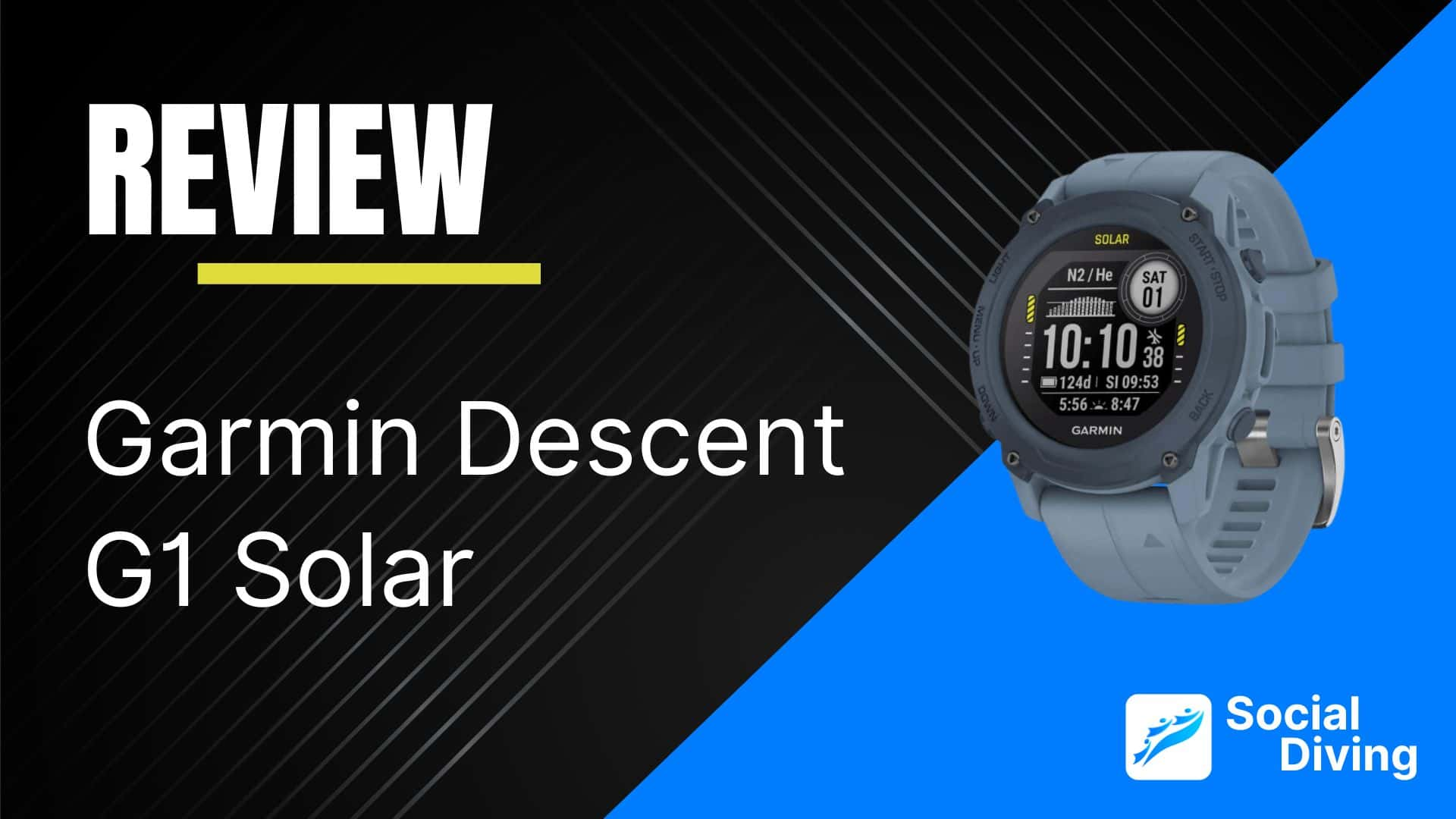If the thought of becoming a more sustainable and eco-friendly diver intrigues you, you should have a closer look at the Garmin Descent G1 Solar! As of 2025, it is the only solar-powered dive computer on the market.

We already think its bigger brothers the Descent Mk3, Mk2i, and Mk1 are absolutely superb pieces of equipment and the Garmin G1 Solar does not disappoint either.
It's also only about half the price of the big flagships which makes it really interesting for divers on a budget!
Of course, we also read other opinions online but in the end, nothing beats real world experience. So we took the time for a thorough Garmin Descent G1 Solar test and review! Below you find everything you need to know, including features, specs and what we like, and don't like about it.
Review Summary
Our Rating
What We Like
- Solar powered
- Clear display
- Much more affordable than other Garmins
- Great freediving computer
- Rugged, durable construction ideal for harsh environments
- Multi-sport
- Integrates with other Garmin offerings
- Different color options
Reasons to Avoid
- No air integration
- Monochrome display
- A bit small
- Navigation a bit tricky
- Can be overkill for beginner divers
- Design a bit rough
Get it here


First Impression
In a hurry and looking for the gist of things? Here is our review in short. Keep reading for the entire version.
The Garmin Descent G1 Solar is – as the name suggests – the only solar-powered dive computer on this list and wins our most eco-friendly award! It combines the raw features of the Garmin Descent dive computer line with a no-nonsense minimalist display. Don’t go looking for brilliant colors here, as you won’t find them. The G1 Solar is much leaner than its bigger brothers and everything feels a bit..smaller.
This is not to say that the G1 Solar can’t do multi-sport, vitals tracking, diving down to 100m / 300ft etc. It does all that and is really good at it, as well. However, it doesn’t offer WiFi connectivity or some other features we see in bigger smartwatches. But at least its only about half the price of the Mk2i!
If you want to buy into the amazing Garmin Descent dive computer line without the huge price tag, the Garmin Descent G1 Solar is a great and affordable choice. And it’s solar-powered!
About Garmin Dive Computers
Garmin launched its dive computers line in 2018 with the Garmin Descent Mk1 and made quite a splash. It takes something to disrupt an entire industry and blow lines of competitors out of the water. However, that’s exactly what they did by introducing the novel combination of premium dive computer and full-blown smartwatch.
Garmin has since followed up on that with the Garmin Descent Mk2i that introduced air integration, and the brand-now Descent Mk3 which comes with a 200m / 660ft depth rating.
The Garmin Descent G1 Solar enters the market as another super innovative piece of tech with its solar charging capabilities that promise longevity and independence from the next outlet. Building on Garmin’s strong reputation for outdoor and fitness devices, the G1 Solar is a dive computer that appeals to sustainable divers and those who like to dive on a budget!
Build Quality
The Garmin Descent G1 Solar is constructed with a fiber-reinforced polymer case, offering outstanding durability suitable for rugged dive environments. It has a 100m / 330ft depth rating which is good for recreational and technical diving, and it feels super solid.
Even after smacking it against several door frames and such, there are no scratches to be found.
Our rating: 5 / 5
Design & Display
This is really something where the Garmin Descent G1 Solar falls short a bit. As much as we want to love it…it doesn’t look as nice as others we have tested. The monochrome, high-resolution display is designed for clarity, offering excellent visibility in various lighting conditions, both underwater and on the surface. But…well…it’s monochrome.
In times of 4k displays and the terrific Apple Watch Ultra 2 screen, it feels a bit like playing an old Tetris game. Retro. If you like it, perfect!
Since it’s so small, however, it’s really nice for long-distance running!
The inclusion of a Power Glass™ solar charging lens is a unique design element that aids in charging the device using sunlight. It doesn’t influence clarity so that’s a plus.
Our rating: 3 / 5
Features and Performance
This dive computer comes packed with features which we’ll look at here. However, being much smaller and cheaper than its big brothers, the G1 does not offer air integration, Wifi connectivity, or maps!
Solar Charging Feature
The outstanding feature of the Garmin Descent G1 Solar is obviously the solar charging capability. We’re happy to report it works flawlessly and is really convenient! It extends the battery life significantly, especially when spending long hours on the surface, making it an excellent companion for multi-day dive trips.
Far too often we have been on liveaboard ships that have way too few outlets for everyone to charge all devices, so solar-charging is really a step up!
Dive Modes & Freediving
The Descent G1 Solar is not just a dive computer; it is an all-in-one sports watch featuring multiple dive modes, including single-gas, multi-gas, gauge, and apnea. Actually, we really love the freediving mode on the G1 and think it’s one of its standout features!
Fitness and Activity Tracking
In true Garmin fashion, the G1 Solar doubles as a robust fitness tracker, offering heart rate monitoring, a pulse oximeter, and various activity profiles for when you’re not under the water.
GPS
While there is no extended mapping feature, there is a trusted Garmin GPS sensor so you can access entry and exit locations in your logbook or use it for running or hiking. The Descent G1 will automatically mark surface entry and exit points in the water using multi-GNSS satellite support so it really doesn’t get easier than that!
Our rating: 4/5
Ease of Use
Garmin dive computers are always pretty simple to get started but take a bit of getting used to for everything else. That’s to be expected from so many features so we’re not deducting points here.
The device allows for the customization of data fields and display settings to suit individual preferences and diving activities. It’s a bit stripped down in comparison to the Descent Mk2i but we like it.
Navigation isn’t as intuitive but that could also be because we’re not sold on the monochrome display.
Our rating: 4 / 5
Apps & Connectivity
The Garmin app system is usually our favorite part but this too is a bit reduced here. Most noticeably that some of the multi-color apps simply don’t work. You get an excellent logbook and the Garmin App is still outstanding, though. For a computer at this price point, we give it full points!
The G1 Solar is Connect IQ™ compatible, so you can add personality by downloading custom watch faces, data fields, apps, and widgets. We like the feature to use the Garmin Dive App to view popular dive sites that have been rated and reviewed by other users. (Or visit Social Diving for that!)
Our rating: 5 / 5
Battery Life & Charging
The solar charging capability significantly extends the battery life, which is particularly beneficial during long liveaboard trips or outdoor activities. In dive mode, the battery can last up to 80 hours, and in smartwatch mode, it can extend up to several weeks, depending on solar exposure.
Honestly, it’s a bit hard to put a number on this as you can recharge it in the sun whenever you like, but even without it, you get AMAZING battery life.
Our rating: 5 / 5
Diving With the Garmin Descent G1 Solar
When we review scuba gear, we always test it from 4 perspectives: Recreational divers, technical divers, dive professionals, and instructors, as well as freedivers and snorkelers.
On the one hand, we have team members from all these sides so it’s easy for us to test it this way. On the other hand, we think all these groups have individual requirements and what might work for one doesn’t have to work for the others.
Garmin Descent G1 Solar for recreational diving
We really think the Garmin Descent G1 Solar is great for anyone. If you like diving as a recreational diver and go on at least one or two dive trips per year, the Garmin G1 Solar is an excellent choice.
Not only does it include anything you could ever want in a dive computer, but since it can double as your sports watch, it’s a steal! It’s also small enough for women and others with smaller wrists.
Garmin Descent G1 Solar for technical diving
Technical divers CAN use the G1 Solar, however, it probably won’t be their first choice. It’s just a bit too small, we feel. It’s an excellent backup though that is cheap and high-quality. It also includes good algorithms and multiple staging gases.
Garmin Descent G1 Solar for dive instructors
As scuba instructors, we like the G1 and think you will, too! It’s small, indestructible, doesn’t break the bank, and you usually don’t have to worry about charging it manually. The display is a bit small which isn’t optimal in all situations.
This can also be a pro, though, especially if you are one of the instructors who like to hide their display from students as not to distract them.
Garmin Descent G1 Solar for freediving and snorkeling
Unexpectedly, we were REALLY pleasantly surprised by the G1 Solar’s freediving mode! Freedivers will enjoy customizable dive and surface screens in apnea modes, plus more metrics like ascent and descent rates to analyze performance between dives. It’s small and handy and the solar charging means you can really take the barebones travel and dive approach to the max!
Decompression Model
The decompression model is the final thing we must look at when reviewing a dive computer, as the choice of algorithm largely determines its usability and reliability underwater.
While the following analysis might be a little technical, it’s important to know these things as a scuba diver. However, you can also skip ahead to here.
Decompression algorithm
The Garmin Descent G1 Solar uses the Bühlmann ZHL-16C decompression model that you can find in all Garmin dive computers. It is a modified version using a modern gradient factors approach.
If you have followed our articles for long enough, you know that this is our personal favorite decompression model and my recommendation for all experienced and technical divers.
The Bühlmann model uses 16 body tissue compartments to simulate the on and off-gassing of the human body underwater. Each compartment comes with different rates of Nitrogen on and off-gassing. Depending on how long these compartments have been under Nitrogen load during a dive, the required decompression time changes.
Gradient factors
Gradient factors make the Bühlmann model adaptable to modern scuba diving. They essentially allow the user to alter the algorithm to change the acceptable levels of tissue load and select different levels of algorithm conservatism.
Divers can incorporate decompression stops and durations that differ from the original model to accommodate their dive plan better. This is done by setting the “conservatism” option to either low, medium, or high, which adjusts the gradient factor accordingly.
Experienced divers can even manually set the gradient factor with their custom conservative option.
In practice
The Bühlmann ZHL-16C decompression model is one of the oldest and most commonly applied decompression algorithms used today. It has been scientifically proven and is trusted by the majority of technical divers around the world.
Using gradient factors means that we can simply switch the conservatism setting to be more liberal (low) or conservative (high), depending on our requirements.
For beginner and intermediate divers, I recommend leaving the setting at default. The air integration feature also allows for even more accurate calculations as respiratory minute volume and breathing rate are taken into consideration.
The Garmin Descent G1 Solar makes use of the best decompression model for scuba divers and based on this, I can wholeheartedly recommend them.
Conclusion
With its robust build and innovative solar charging, the Garmin Descent G1 Solar is a versatile and eco-friendly dive computer that is great for those who want Garmin quality without the huge price tag! Just don’t expect the most colorful display.
If you have any other questions or need advice, leave us a comment below and get the conversation started.
Join the email list to get regular diving, travel, and outdoor tips, tricks, news and our latest deals straight to your inbox!
Where to Buy

